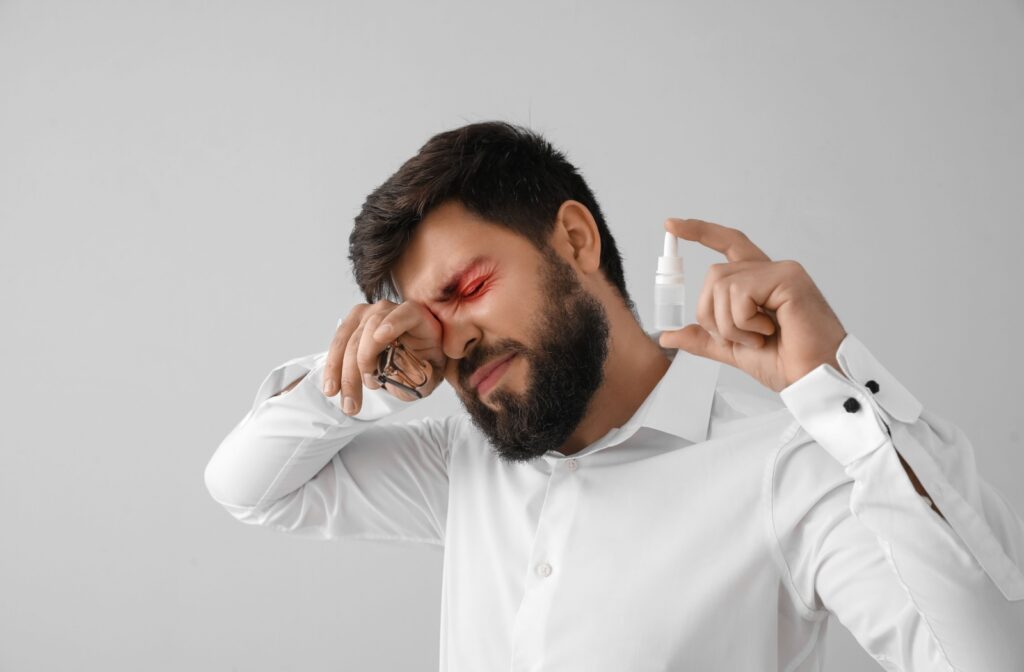Dry eyes are one of the most common complaints eye care professionals hear about. Burning, stinging, and irritation in your eyes is uncomfortable, to say the least. While research on eye nutrition for dry eyes is still evolving, symptoms of dry eyes can be caused by a lack of Vitamin A, Vitamin D, Vitamin B12, or Omega-3.
Recognizing the signs of dry eyes and how vitamin nutrition can impact your eye health can help you figure out how to take control of your dry eyes and the ways you can find relief.
What Are Dry Eye Symptoms?
Dry eyes can manifest in various ways. Common symptoms include a stinging or burning sensation, a feeling of something in your eye, redness, and blurred vision. You might also experience excessive tearing, which is your eyes’ response to irritation.
These symptoms aren’t just uncomfortable—they can interfere with daily activities like reading, driving, and using digital devices. Addressing the symptoms promptly can improve your quality of life and prevent long-term damage.
When to Seek Professional Help
Nearly 6.8% of adults in the United States experience dry eye syndrome. If you notice persistent symptoms, it’s essential to consult with an eye care professional. They can diagnose the cause of your dry eyes and recommend appropriate treatments. Early intervention can prevent more severe issues down the line.
Vitamin Deficiencies That Cause Dry Eye Symptoms
Proper nutrition is essential for your general health, but also for your ocular health! Fruits, vegetables, meats, grains, nuts, fish, and legumes can all have positive benefits for your eyes. When some of these vitamins are missing, they can cause a whole host of symptoms or illnesses, including dry eyes.
Vitamin A
Vitamin A is often the number one culprit for dry eyes when it comes to vitamin deficiency because of how crucial it is for maintaining healthy vision. It produces tears, lubricates your eye, and supports the cornea by improving the smoothness of the tear film (the thin layer of fluid on the eye). An imbalance of water, mucin, or oil can lead to the eyes not being coated properly.
A lack of Vitamin A hinders the production of tears, which can lead to severe dryness and even night blindness or more severe eye conditions if left untreated.
Foods rich in Vitamin A include carrots, sweet potatoes, pumpkins, tomatoes, mangos, and dark leafy greens. You can also take Vitamin A supplements, but try to avoid taking more than 10,000 IU (including what you’re eating) to prevent toxicity, which can cause nausea, headaches, skin irritation, and joint pain.
Vitamin D
While Vitamin D is commonly associated with sun and skin health, it also plays a role in reducing eye inflammation, promoting tear secretion, and improving tear quality. Ongoing research suggests there is a link between low levels of Vitamin D and dry eye symptoms, so getting adequate Vitamin D can help maintain eye moisture and overall eye health.
Vitamin D is a fat-soluble vitamin, meaning it can be stored in your body for a long time. However, even though sunlight is a common way of getting Vitamin D, the sun rarely provides enough daily Vitamin D. In fact, around 41.6% of the U.S. population has a Vitamin D deficiency, making it an essential vitamin to include in your diet.
While only a handful of foods contain significant amounts of Vitamin D, you can find it in fatty fish, cheese, and egg yolks.

Vitamin B12
Vitamin B12 helps the body most by making DNA and nerve cells, but recent studies have shown that deficiency in this vitamin is associated with severe dry eye disease and eye pain. Some studies have shown that Vitamin B12 can repair the corneal nerve layer, which can alleviate burning sensation symptoms in dry eyes.
Fortified breakfast cereals and nutritional yeasts are sources of Vitamin B12, though are mostly commonly present in animal byproducts including fish, meat, poultry, eggs, and dairy products.
Omega-3 Fatty Acids
While not a vitamin, omega-3 fatty acids are vital for eye health. They help in tear production and reduce inflammation, which can alleviate dry eye symptoms. omega-3s are particularly beneficial for those suffering from chronic dry eyes.
Just like Vitamin D, omega-3 fatty acids are frequently found in fatty fish like salmon, tuna, sardines, herring, mackerel, and anchovies. You can also consume omega-3 fatty acids through nuts and seeds, soybeans, and leafy vegetables.
Supplements are also options for all these vitamins if dietary sources aren’t sufficient.
The Connection Between Diet & Eye Health
Vitamins, antioxidants, and minerals can help support your eye health, with some nutrients even helping reduce the risk of developing eye diseases and conditions like age-related macular degeneration, glaucoma, diabetic retinopathy, and cataracts.
As discussed above, many nutrients are essential for maintaining and repairing your eyes’ tissues and fluids. Antioxidants (like vitamins C & E) help delay oxidation, which causes cell death, and leads to clouding and hardening of the eye’s lens. Fruits, vegetables, nuts, and seeds are often rich in antioxidants.
Additionally, staying well-hydrated is super beneficial for your eye health, since water aids in tear production and keeping your eyes lubricated. If you’re experiencing dry eyes, one solution can be to try regularly drinking the recommended amount of water every day.
Other Causes of Dry Eyes
While vitamin deficiency can be a simple answer to the causes of dry eyes, it’s not the only reason. Dry eye symptoms may also be caused by:
- Environmental Factors like wind, dry air, and pollution
- Lifestyle Choices like long hours staring at screens, smoking, and lack of sleep
- Health Conditions like diabetes, rheumatoid arthritis, and thyroid disorders
- Medications like antihistamines, decongestants, and antidepressants
Over-the-counter products like eye drops can provide relief to dry eyes. However, if your symptoms persist, consult with an eye care professional.
Total Vision is proud to be equipped to treat a wide variety of vision problems and eye diseases. Contact us today to see how our dry eye therapy can benefit you.



